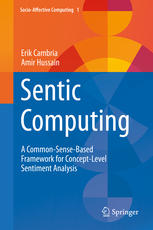

Most ebook files are in PDF format, so you can easily read them using various software such as Foxit Reader or directly on the Google Chrome browser.
Some ebook files are released by publishers in other formats such as .awz, .mobi, .epub, .fb2, etc. You may need to install specific software to read these formats on mobile/PC, such as Calibre.
Please read the tutorial at this link: https://ebookbell.com/faq
We offer FREE conversion to the popular formats you request; however, this may take some time. Therefore, right after payment, please email us, and we will try to provide the service as quickly as possible.
For some exceptional file formats or broken links (if any), please refrain from opening any disputes. Instead, email us first, and we will try to assist within a maximum of 6 hours.
EbookBell Team

5.0
78 reviewsThis volume presents a knowledge-based approach to concept-level sentiment analysis at the crossroads between affective computing, information extraction, and common-sense computing, which exploits both computer and social sciences to better interpret and process information on the Web.
Concept-level sentiment analysis goes beyond a mere word-level analysis of text in order to enable a more efficient passage from (unstructured) textual information to (structured) machine-processable data, in potentially any domain.
Readers will discover the following key novelties, that make this approach so unique and avant-garde, being reviewed and discussed:
• Sentic Computing's multi-disciplinary approach to sentiment analysis-evidenced by the concomitant use of AI, linguistics and psychology for knowledge representation and inference
• Sentic Computing’s shift from syntax to semantics-enabled by the adoption of the bag-of-concepts model instead of simply counting word co-occurrence frequencies in text
• Sentic Computing's shift from statistics to linguistics-implemented by allowing sentiments to flow from concept to concept based on the dependency relation between clauses
This volume is the first in the Series Socio-Affective Computing edited by Dr Amir Hussain and Dr Erik Cambria and will be of interest to researchers in the fields of socially intelligent, affective and multimodal human-machine interaction and systems.